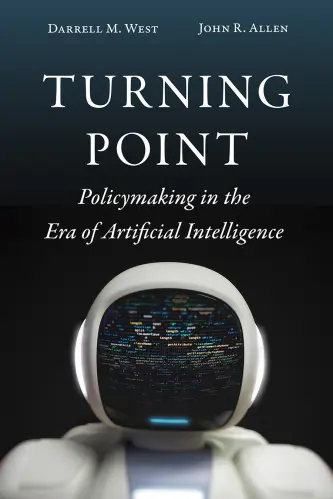On July 29, America will be treated to unprecedented congressional testimony from four of the most powerful technology leaders in the world: Jeff Bezos of Amazon, Tim Cook of Apple, Sundar Pichai of Google/Alphabet, and Mark Zuckerberg of Facebook. The reason for this extraordinary appearance before the House Judiciary Antitrust Subcommittee is to discuss competition policy and antitrust issues during an era where large companies exercise considerable market power.
But the public event also provides an opportunity to find out what these influential men think about a range of technology issues. As the co-author of a new Brookings Institution Press book with President John R. Allen entitled Turning Point: Policymaking in the Era of Artificial Intelligence, here are questions that would shed considerable light on current technology controversies facing the United States and the world.
- Have you hired ethicists to help you design products and think about the societal ramifications of your technologies? If so, how do you use them to make decisions and if not, why have you not done so?
- Do you believe the California Consumer Privacy Act is a good model for the nation to adopt and would you encourage members of Congress to pass legislation modeled on that bill?
- How have you diversified your corporate leadership team and your company workforce and what are the current breakdowns for your company as a whole by race, gender, ethnicity, and U.S. states where employees work?
- What have you done to stop the use of your products for racist appeals, hateful actions, or false information? Do you believe private technology companies have an obligation to protect democracy, slow the spread of hate speech, and promote fair elections? If so, how do you define hate speech and fair elections? If not, why not?
- What role do you think government regulation should play in the technology sector? What activities should be subject to regulation and which ones should not be? What agency should administer the particular regulation(s)? How much regulation should take place at the national as opposed to the state level?
- According to an Edelman Trust Barometer, 66 percent of people around the world “worry technology will make it impossible to know if what people are seeing or hearing is real.” Do you have any responsibility for assuaging these fears and what concrete steps are you taking to reduce those fears?
- Do you believe technology companies have a responsibility to combat bias and enforce anti-discrimination laws on their digital platforms?
- How much legal liability do you think technology companies should have for what happens on their platforms?
- Much of our country’s Gross Domestic Product is created on the East Coast, West Coast, and a few metropolitan areas in between. Will you commit to establishing more offices or warehouses and hiring more fulltime employees who work in states where technology-sector jobs have not been as common?
- Do you think artificial intelligence runs the risk of expanding out of control and threatening the human species?
- Do you believe Congress should bring back the Office of Technology Assessment, which was abolished in 1995 just as the digital era was starting? If so, how would you define its mission and what kind of work would you like to see it undertake in its advice to members of Congress? If not, why not?
- Would you currently ride in a fully autonomous vehicle that was operating at 60 miles per hour on an interstate highway? Would you ride in a fully autonomous vehicle operating at the speed limit in the crowded streets of a major downtown area?
- Do you believe law enforcement and immigration officials should use facial recognition technology to identify suspects and prosecute criminals? How long do you think images stored for purposes of facial recognition should be held by law enforcement?
- Do you think the U.S. internet should be governed by the net neutrality principles of anti-discrimination, a prohibition against paid prioritization, and no blocking or slowdown of online traffic?
- How do you protect the integrity of your personal online identity and what steps do you advise other Americans to undertake in order to safeguard their online privacy and security?
- How do you think the United States should handle relations with China in regard to intellectual property, cybersecurity, and human rights?
- How do you think the United States should handle relations with Russia in regard to intellectual property, cybersecurity, and human rights?
- Thirty years from now, what do you think will be the dominant news headlines about digital technology? What do you want those headlines to say?
- What is your greatest fear about technology today?
- What is your greatest hope about technology today?
- What is the one digital product or service you wish had never been created and why that product?
Facebook, Amazon, Google, and Apple are general, unrestricted donors to the Brookings Institution. The findings, interpretations, and conclusions posted in this piece are solely those of the author and not influenced by any donation.
The Brookings Institution is committed to quality, independence, and impact.
We are supported by a diverse array of funders. In line with our values and policies, each Brookings publication represents the sole views of its author(s).






Commentary
Questions for technology CEOs testifying before Congress
July 14, 2020